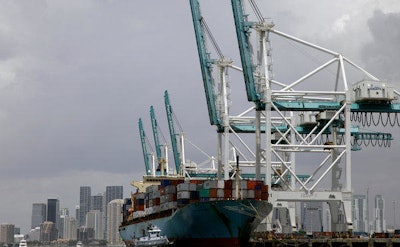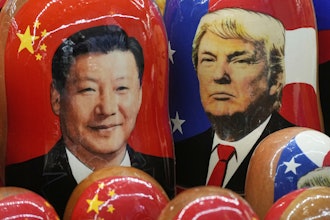
 According to author Mike Collins, America’s trade deficit is the single biggest obstacle to creating manufacturing jobs, and to keeping manufacturing jobs in this country. He also agrees with Warren Buffett who says, “The U.S. trade deficit is a bigger threat to the domestic economy than either the federal budget deficit or consumer debt and could lead to political turmoil.”
According to author Mike Collins, America’s trade deficit is the single biggest obstacle to creating manufacturing jobs, and to keeping manufacturing jobs in this country. He also agrees with Warren Buffett who says, “The U.S. trade deficit is a bigger threat to the domestic economy than either the federal budget deficit or consumer debt and could lead to political turmoil.”
Collins recently wrote about America’s trade deficit including what it is, plus who wins and loses because of it. I suggest you check it out, but in it, Collins explains that:
“Normally trade deficits are self-correcting because, as the deficit grows, the country’s currency begins to decline in price in the world market. This makes exported goods less expensive and foreign goods more expensive, and trade is supposed to balance itself.
“In the case of America, this balance is not happening because many of our trading partners have figured out how to manipulate their currencies to keep the dollar value high so that they can continue to increase our imports.”
So not only is the trade deficit possibly hurting manufacturing at home, but currency manipulation by foreign countries that the U.S. trades with could be making it worse. On Oct. 15, the U.S. Department of Treasury will release its semi-annual Report to Congress on International Economic and Exchange Rate Policies. The department’s April report acknowledged China’s continued actions to impede market determination, but didn’t name China as a currency manipulator.
The Alliance for American Manufacturing (AAM) asserts that currency manipulation is hurting domestic manufacturing. In a letter this week, the organization put pressure on the U.S. Treasury Secretary, Jack Lew, to do what he can to reverse the problem.
In the letter sent to Secretary Lew, AAM President Scott Paul said:
“We appreciate that Treasury has noted some of these factors in past reports and, from time to time, engages the governments of China and Japan in dialogue on currency manipulation. We fully expect you to engage your international colleagues this week during the annual International Monetary Fund meetings. Those words, however, mean little to the millions of U.S. manufacturing workers who expect a level playing field but have grown disenchanted with America’s inadequate response.”
You can read the full letter here.
According to AAM, the situation has only grown worse in the last six months and notes that:
- The dollar/yuan exchange rate is the same this week as it was 17 months ago, falling 1.63 percent below its high-water mark in January 2014.
- Through August 2014, the U.S. goods trade deficit with China was $10 billion higher than in the same time period the previous year.
- China is not alone in its market distortions. Government officials in Japan have publicly acknowledged efforts to weaken the yen, which has lost 30 percent of its value against the dollar over the past 18 months.
AAM feels that the direct result of these actions is lost U.S. economic activity and jobs.
What Do You Think?
Is the U.S. trade deficit hurting American manufacturing and jobs? How about foreign currency manipulation? Should the U.S. do more to curb its trading partners’ practices? Have currency manipulation and the trade deficit affected your business? Tell us what you think by leaving your comments below.






















